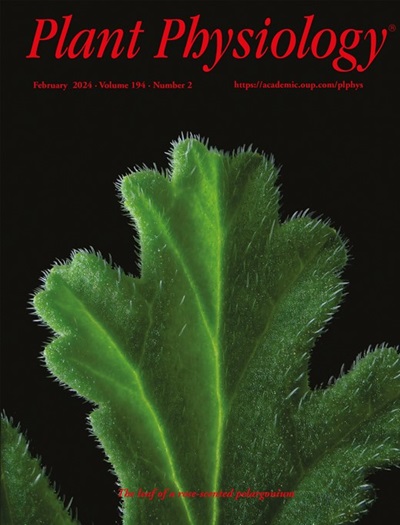The clock component LHY1b negatively regulates alkaline stress by repressing AOX1-mediated oxidative responses in soybean
IF 6.5
1区 生物学
Q1 PLANT SCIENCES
引用次数: 0
Abstract
Increasing the ability of crop plants to maintain productivity in saline-alkaline lands is an absolute requirement for feeding the growing population. However, a shortage of knowledge about plant alkaline tolerance restricts breeding of salt-tolerant crops. Here we demonstrate that a homolog of the circadian clock component LATE ELONGATED HYPOCOTYL (LHY) negatively regulates reactive oxygen species (ROS) homeostasis and time-gates oxidative stress responses under NaHCO3 conditions in soybean (Glycine max). Yeast one-hybrid assays followed by chromatin immunoprecipitation coupled with quantitative PCR, electrophoretic mobility shift assays, and dual-luciferase reporter assays revealed that LHY1b binds directly to the promoter of Alternative Oxidase 1 (AOX1). Through immunoblotting using AOX1 antibody, we demonstrated that AOX1 accumulates considerably in lhy1b under NaHCO3 conditions. LHY1b strongly inhibits AOX1 transcription under normal growth conditions. However, this inhibition is removed under alkaline stress, allowing the expression of AOX1 and restricting the generation of ROS. Knockdown of AOX1 in lhy1b renders this mutant more sensitive to alkaline stress. Moreover, we determined that the naturally occurring LHY1bH2 allele is associated with alkaline tolerance by phenotyping 559 sequenced soybean accessions. Our study demonstrates a molecular link between clock components and alkaline tolerance and provides a valuable target gene for breeding alkaline-tolerant soybean varieties.时钟组分LHY1b通过抑制aox1介导的大豆氧化反应负向调节碱性胁迫
提高作物在盐碱地上保持生产力的能力是养活不断增长的人口的绝对需要。然而,植物耐碱性知识的缺乏制约了耐盐作物的选育。在这里,我们证明了生物钟成分LATE ELONGATED HYPOCOTYL (LHY)的同系物在NaHCO3条件下负调控活性氧(ROS)稳态和时间门氧化应激反应(Glycine max)。酵母单杂交试验、染色质免疫沉淀、定量PCR、电泳迁移率转移试验和双荧光素酶报告基因试验表明,LHY1b直接结合替代氧化酶1 (AOX1)启动子。通过使用AOX1抗体进行免疫印迹,我们发现在NaHCO3条件下,AOX1在lhy1b中大量积累。在正常生长条件下,LHY1b强烈抑制AOX1的转录。然而,这种抑制在碱性胁迫下被去除,允许AOX1表达,限制ROS的产生。lhy1b中AOX1的敲除使该突变体对碱性胁迫更敏感。此外,我们通过对559份测序的大豆材料进行表型分析,确定了天然存在的LHY1bH2等位基因与碱性耐受性有关。我们的研究揭示了时钟组分与耐碱性之间的分子联系,为培育耐碱性大豆品种提供了有价值的靶基因。
本文章由计算机程序翻译,如有差异,请以英文原文为准。
求助全文
约1分钟内获得全文
求助全文
来源期刊

Plant Physiology
生物-植物科学
CiteScore
12.20
自引率
5.40%
发文量
535
审稿时长
2.3 months
期刊介绍:
Plant Physiology® is a distinguished and highly respected journal with a rich history dating back to its establishment in 1926. It stands as a leading international publication in the field of plant biology, covering a comprehensive range of topics from the molecular and structural aspects of plant life to systems biology and ecophysiology. Recognized as the most highly cited journal in plant sciences, Plant Physiology® is a testament to its commitment to excellence and the dissemination of groundbreaking research.
As the official publication of the American Society of Plant Biologists, Plant Physiology® upholds rigorous peer-review standards, ensuring that the scientific community receives the highest quality research. The journal releases 12 issues annually, providing a steady stream of new findings and insights to its readership.
 求助内容:
求助内容: 应助结果提醒方式:
应助结果提醒方式:


